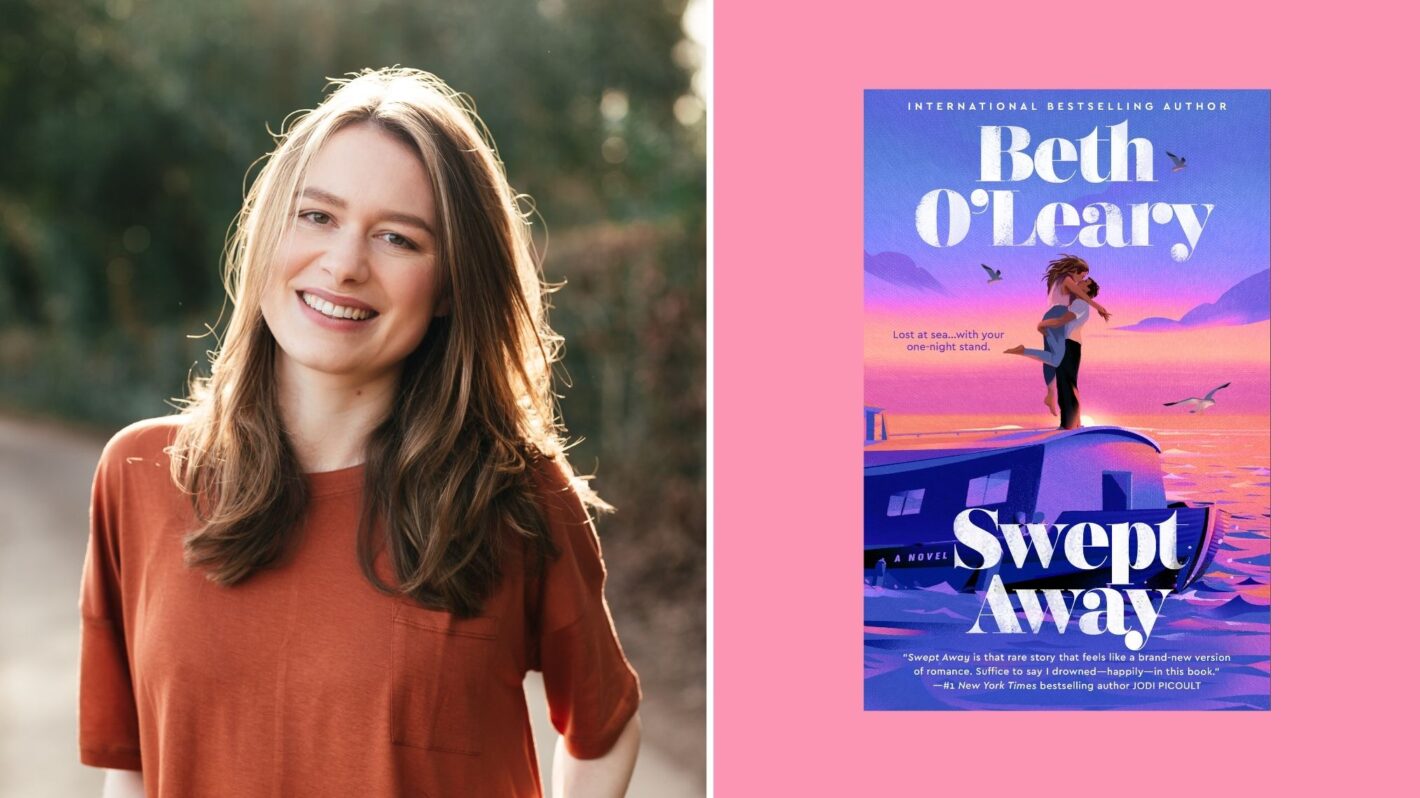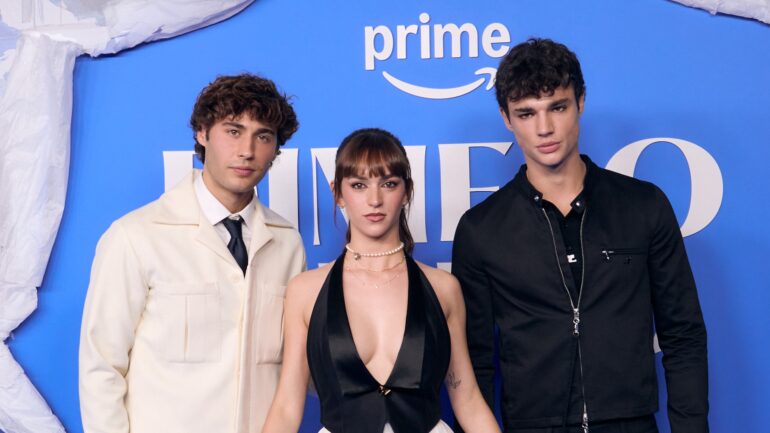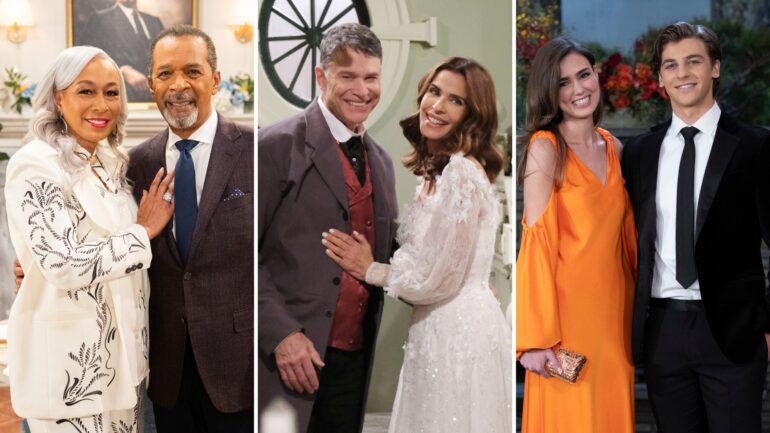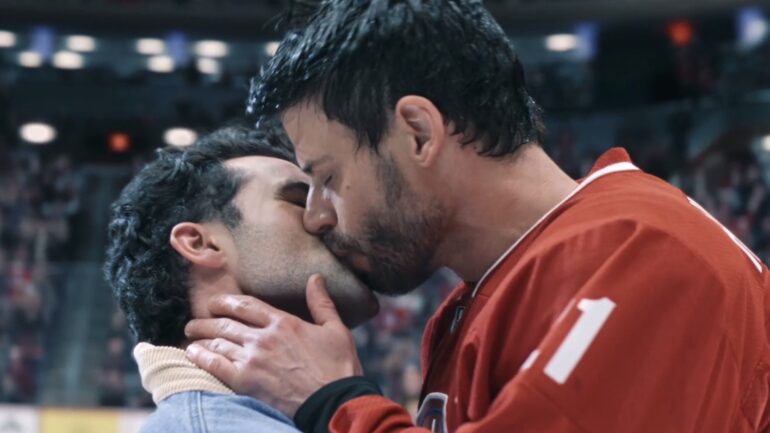Exclusive Interview
Beth O’Leary Gets ‘Swept Away’: Inside Her New Stranded at Sea Love Story

How long could you spend with a one night stand post-hookup? An hour? A day? Beth O’Leary puts this question to the test in her new romance Swept Away, which finds her protagonists in a tight spot (literally) when they get stuck at sea together.
All Lexi wants when she stumbles away from her local bar with Zeke, an attractive younger man, is to have one good night of fun on her houseboat and never talk to him again. However, their one-night-stand takes a turn. First, they awaken the next morning floating adrift in the sea with no way to find help, and their resources quickly dwindling. Second, how does Lexi, who runs from relationships, navigate living with Zeke, who finds himself drawing closer to Lexi each day?
Swooon spoke to O’Leary, the author behind romance hits such as The Flatshare and The Road Trip, about trying her hand at a survival romance story, her love for the forced proximity trope, how she develops banter, and writing that third act breakup.
What made you want to go the survival romance route with Swept Away?
Beth O’Leary: I always like taking a slightly outlandish, high-concept setup and then trying to ground it. Whether that’s like The Flatshare with two people sharing one bed and never meeting and trying to bring that into the real world, even though that’s kind of an extreme scenario. But this one is my most high concept to bring back down to earth. I had the idea when I was playing around with new takes on classic romance tropes, and I love the [concept] of being stranded on the desert island together. At the same time, a few friends were buying houseboats in London as a way to be able to afford a place to live in the city when flats are so expensive. It became a bit of a millennial thing to do for a minute. The two ideas just melded together. I love this idea of someone totally clueless buying a houseboat and the possibility of how wrong that could go. It really only struck me when I started writing how that was going to be a survival story. In the process of making that feel real and grounded and like you’re right there with them in that scenario, I was going to need to go quite dark. It was going to have to be deep and big, and they were going to have to have moments where they really thought they might die. But I wanted to go all in. It’s a very meaty concept, and I had this sense of, if I’m going to do this, I need to really commit and really do it and have them properly, actually lost at sea.
How did you get yourself in the mindset for such a high stakes romance? Were you watching any shows like Survivor at the time or looking to other genres?
O’Leary: I read lots of autobiographies of people who survived extreme scenarios. I didn’t end up putting a lot of it into the novel, because a lot of that was very specific to whatever situation you’re in. The most helpful conversations I had were with my friend, Paddy, who works for the Royal Navy, who was completely invaluable for sea-related information but also for just giving me more of a sense of what it’s like to be out at sea for a long time. I did make myself [try it]. I spent an hour sitting on a boat, not looking at anything but the sea. Because one of the things that was really tricky about the novel is setting. There was one.
Where did the characters of Lexi and Zeke come from?
O’Leary: I think Lexi came first. I wanted to look at people who might struggle to stay with someone the morning after because the concept lends itself to the idea that we struggle to commit. We walk away after one night with someone, so I was looking at different reasons and ways into that struggle to commit. And if I’m going to put two people in that situation, I want them to be two particularly interesting people to put in that situation. So Lexi has this very tough outer shell, and she’d call herself quite jaded and cynical, but she’s actually very warm-hearted and scared understandably. She walks away from men because then they can’t walk away from her. So I had her first because she seemed like such an interesting person to set out in the boat. And then I asked myself, who should she be with? Like, who’s the perfect fit? I basically match-made Lexi and created her perfect man, or at least a version of that. I liked the idea of Zeke being a little younger than her and playing with that age gap and how it might affect the power dynamic in the boat as well. I really didn’t want to write this heroic guy with this woman helping him out as they survive at sea. I really wanted there to be that awareness of the kind of dynamic between a man and a woman and an enclosed space, and that being complicated. I think him being a bit younger kind of helps give her a bit more power there. And Zeke’s got a very different take on one night stands from her, as in, he’s much more familiar with the idea than she is.
This is also an age gap romance! Are you typically a big fan of age gap romances? How did you want to approach that conversation with Lexi and Zeke?
O’Leary: It’s not a trope that is one of my favorites. It was really about what was right for Lexi, and who she should end up with, rather than looking to play [with the trope]. One of my favorite tropes is forced proximity. You may have guessed it is a trope I love, because I did think to myself, I am always doing this to people! I’m always putting my poor characters [in this situation]. And I’m not sure I can get much more forced proximity than a houseboat.
Speaking of forced proximity, being trapped on a boat with your one night stand takes the forced proximity trope to its limits. How does this extended version of forced proximity both help and at times hurt Lexi and Zeke’s relationship?
O’Leary: I really wanted the isolation to not just be a problem for me, but to be a plus for the reader. I wanted it to make it more intense. I wanted it to up the chemistry and up the drama. I did find that in terms of using it as an advantage, they were stripped from all reality, and one of the advantages of that is they didn’t have the context to each other. So that gave me my twist. In no other situation would they have gone that long and fallen that far in love without finding out more about each other. As well as being a problem, it gave me my solution.
Lexi and Zeke both have an interesting connection: daddy issues. Why did you want that to be a personal wound they could both relate to?
O’Leary: I feel that we’re all so shaped by our families, and I really explore that in this book. It was such a big part of Zeke’s backstory, and then it comes into play [in thinking about] how does her relationship with her parents differ, and how is it similar to his? I wanted to write about an evolved guy, one who does talk about how he’s in therapy and talks about his feelings. I love a grumpy, distant, uncommunicative man as well, but Zeke’s very much not that. An uncommunicative guy can be very sexy, but so can a guy who tells you how he’s feeling and talks about his complex relationship with his father. That felt quite new and fresh to me. I liked the idea of making a sexy guy who’s also like, I’m really upset about this, and I’m working through some stuff about this and trying to be a better person.
I was curious about all of your love interests that you’ve written thus far. Did Zeke feel like you were breaking new ground in any ways? Were there things that you were particularly excited to get to explore with him?
O’Leary: He’s definitely not like the obvious lead. He’s quite interested in fashion, and he’s a real thinker. He’s also slept with a lot of women, which is done lots in romance novels. But it’s a tricky thing to navigate because it can be such a turn off. There’s this [question of] does it cheapen their romance? I liked the challenge of that and showing that someone who is a really emotional person can have been in lots of relationships before. I suppose he has a bit of Leon’s sensitivity from The Flatshare. He’s another open feeling guy, but he’s very different. The Wake Up Call’s lead Lucas is much more gruff and a classic romantic hero.
Let’s talk a bit about banter. It can be so difficult to capture good back and forth between characters. What did you want Lexi and Zeke’s banter to say about their relationship?
O’Leary: Banter was particularly tricky in this one because they’re near death at all times. This is a very post-pandemic book for me because we were in a really extreme situation, and it got me thinking about the ways that we deal with the world suddenly being so different and how do you still laugh even in the middle of a crisis? It’s so human to find yourself normalizing quite quickly to elements of it and being able to banter with somebody and laugh about it and make dark jokes. For me, banter is such a big part of building chemistry between two characters, so I needed them to have that back and forth. But I didn’t ever want it to take away from the seriousness of their situation. So that was a really difficult balance. It does mean that a lot of the time their humor is quite dry, or that they’re laughing at the seriousness of the situation. One of them will make a joke and the other one will be like, “You know what? I don’t want to joke about it right now.” They’re not always in banter mode at the same time, which I think is how you would feel. And I wanted them to build. They sleep with each other first, so it’s not building towards “what would it be like to sleep with him?” It’s like, “I’ve been there with him. I’ve been physical with him, and now I’m building an emotional connection.” I wanted there to be a depth to their communication and banter that’s not flirty in the superficial, fun, buzzy way, and is more flirty in the “I’m really getting to know him” way and almost, despite ourselves, sort of becoming more than friends.
Third act breakups are par of the course in romance, but this one is a biggie. Tell us about writing a breakup that feels like a plot twist.
O’Leary: In terms of the scale of this book, that was my last piece. Like what would be their biggest challenge that I would throw at them? I knew it had to be really big. When I actually started writing, I tried to shape the novel so that it didn’t have that third act or didn’t do it in quite the same way, and I felt like I was waiting for the penny to drop. I was like, God, there’s something that the reader needs because everything’s so tense and it got bigger and bigger. I felt like it needed an explosion for us to come down, and it was so funny. It was one of those moments that are just the best moments in writing a novel, where you feel like it’s been there all along. It’s just been lying there dormant in the novel, kind of waiting for you to notice it. It is, in a sense, both a twist and a third act breakup. I think that’s a really good way of putting it. Because their love is so big by then, it needed to be something that was big. And, sorry, that’s probably the best I can do without, without going into more depth!
What was the swooniest scene for you to write?
O’Leary: I would say the moment in the storm. There’s a particular sex scene where the stakes are just so high for them in terms of the kind of adventure side of the story. It was unlike anything I’d ever written before because it was so dramatic and extreme and wild. It was so fun bringing that energy into the sex scene and actually writing what felt like an end of the world sex scene.






